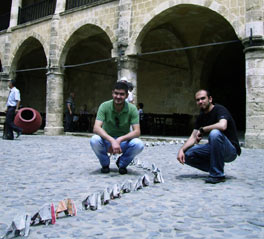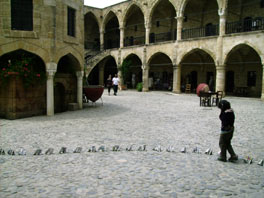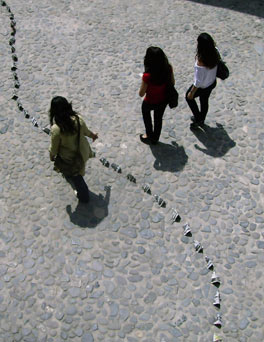![]() Latest work Performances Arranged by Medium A tour via thumbnail images
Latest work Performances Arranged by Medium A tour via thumbnail images
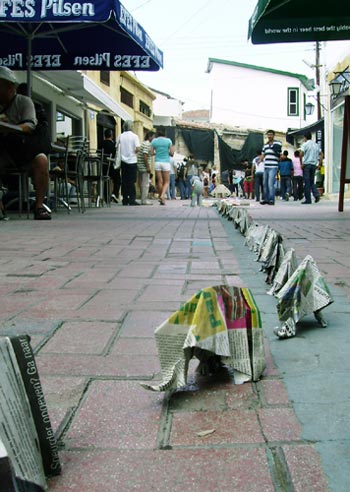
9 May 2009, heading towards
the Ledra Street border crossing from North
into South Nicosia.
"Greetings From Leiden" is a performance featuring origami elephants bearing local news of my city in the Netherlands, the city of Leiden.
The performance involves laying these elephants out along a street, one by one, and responding to people's questions.
Questions such as what is a greeting, about communication in general, or the relevance of communication (or a greeting) in a situation of tension between local communities. As an outsider to the country of Cyprus and to the Nicosia city Ledra Street border, it seemed most appropriate not to bring a statement but rather a greeting. A greeting from one stranger or foriegner to another. In fact the performance was really about dialogue, and how one might go about this when it might seem there is little common ground.
The short animation "And these... ...Y aqeullas" with music by David Dely + the band, Tumba y Quema, was shown in the accompanying exhibition in a city building metres south of the Ledra Street border crossing.
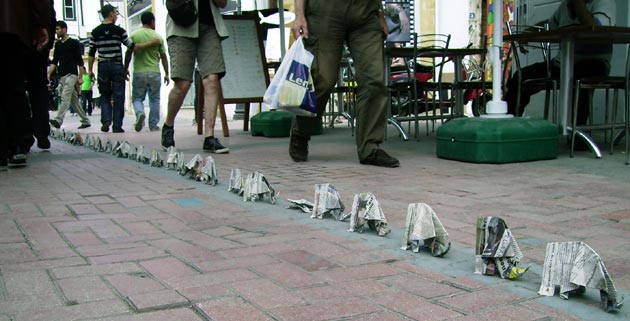
9 May 2009, heading towards the Ledra Street border crossing from North into South Nicosia.
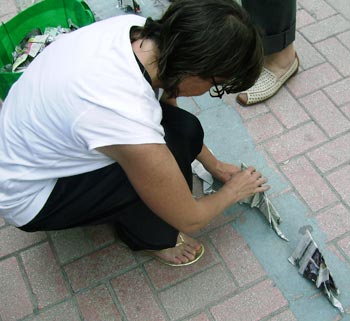
9 May 2009 close to the northern border of the
Ledra Street crossing.
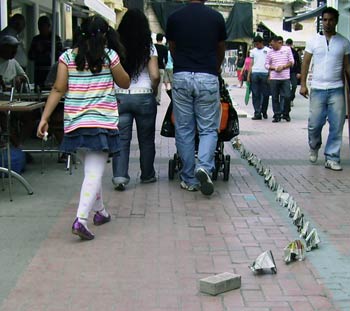
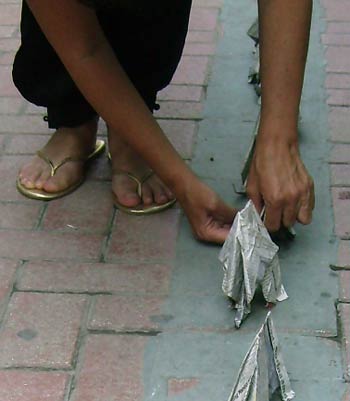
Naturally, there were other implications intended by this piece apart from the expression of a 'greeting' or the oddity of assembling a herd of elephants, imported from the Netherlands. One of my goals was to see how close to or how much into the buffer zone I could take my herd - as a symbollic erasure.
Another aspect of my performance was to care for these beasts as they were knocked over by passing feet or the wind and to do this transparently so those nearby might help me, and they did.
This work was part of the go-ganesha-go project organized by Rose Marie Gnausch.
Initially, for my border crossing performance on both days of the art festival, I placed the first elephant where the exhibition of works by other artists on the northern side of the border stopped and headed for the border. At some point someone put a brick beyond the furtherest elephant as at times I had to leave the herd unattended or there was a crowd around me. So I didn't see who had put the brick there!
I then continued to move this brick elephant-by-elephant closer to the border. I stopped about 1 metre before the buffer zone began, not because of the Turkish speaking border guards who having seen my very slow approach, were now relaxed and informing others about my "news"-paper herd of elephants. No, I stopped because I ran out of elephants. I had only bought 54 with me.
In general, the border guards explained in Turkish that this was art and usually there was a bit of smiling and discussion. Most tourists spoke German and in general I kept to my story that I was taking my Dutch herd across the border (and back again).
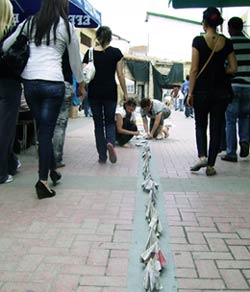
Then on the south side of the border crossing on this main street of Nicosia, I started laying out the elephants. Progressively I started laying out the elephants closer and closer to each side, aiming to get as many of my elephants into the UN controlled buffer zone as I could over the course of the two day art festival.
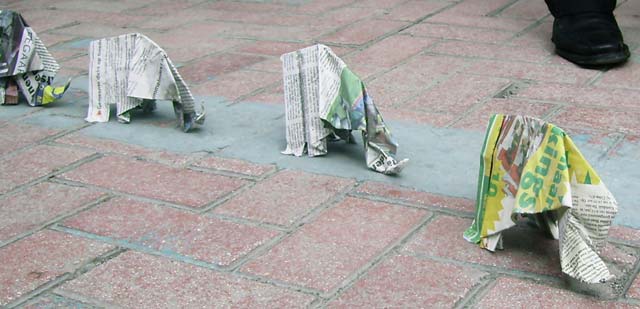
9 May 2009 close to the northern border of the Ledra Street crossing.
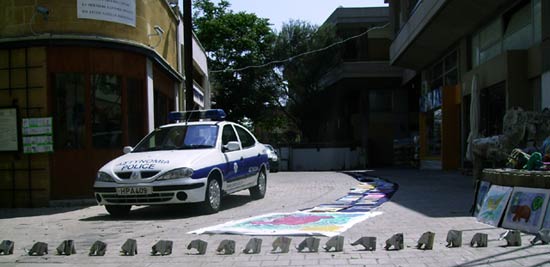
10 May 2009: about 100 metres south of the Ledra Street border crossing, South Nicosia, Cyprus.
You see some of the artworks that were part of the two day festival.
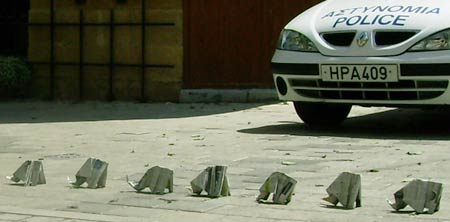
On the
second day of the art festival
I started
to lay out my elephants about 100 metres south of the
Greek Cypriot
Ledra (Lidhras or Lefkosia) street checkpoint - since 1974 this street through the centre of Nicosia has been blocked and divided into two by the UN controlled buffer zone, also known as The Green Line because of the green road or street markings.
I headed north, taking my
elephants as
far into the
buffer zone as
I was allowed to by the
border guards.
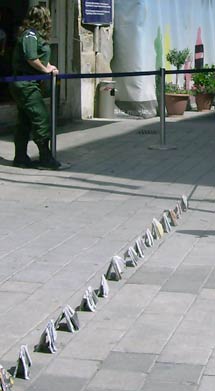
10 May, 2009 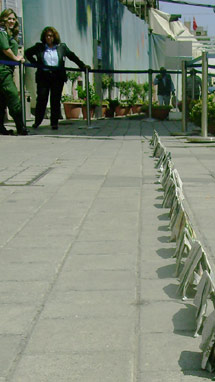
During the second walk, I managed
to get one of the elephants
into the buffer zone before the guards
told me to stop. I then took the rest
in my bag
along with my passport
through to the other side.
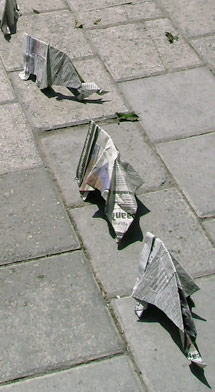
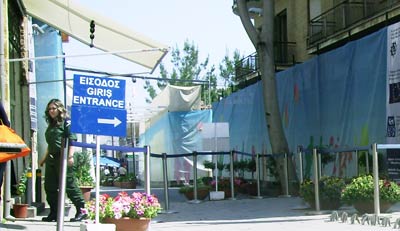
10 May, 2009, at Lidhras Street border (the Greek Cypriot side).
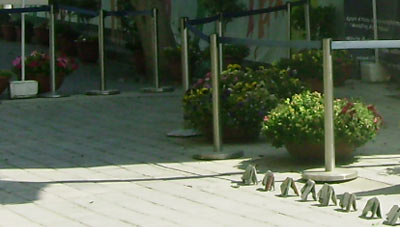
Where I was first asked to stop. 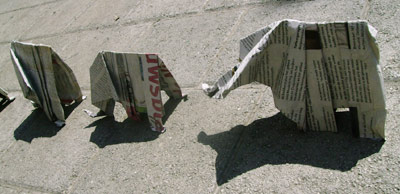
>> Click to view a high quality version (350 kb) of this image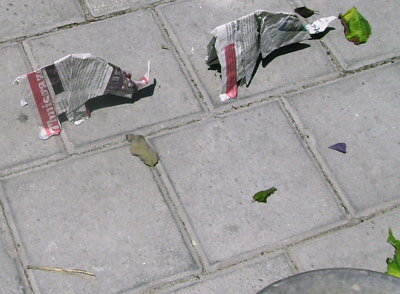
The elephant on the right is in the buffer zone and the other
crosses over from the border of southern Cyprus.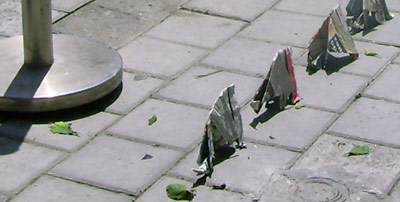
After two days and about 40 crossings,
I got 5 elephants into the buffer zone from the southern side.
On the northern side, I had to stop at 10 because of a wall.
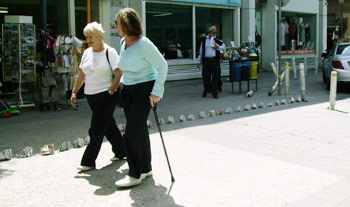
The origami elephants on 7 May, 2009
on the Lidhras Street (Greek Cypriot side of Nicosia).
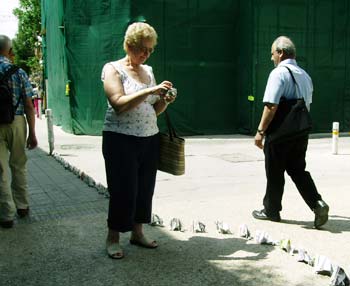
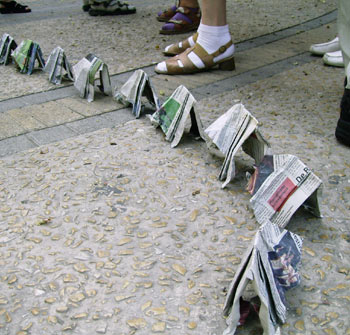
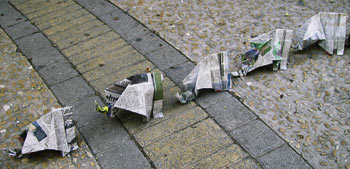
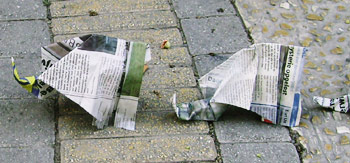
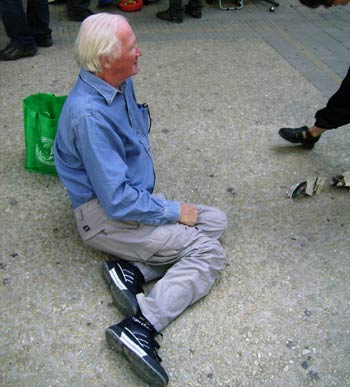
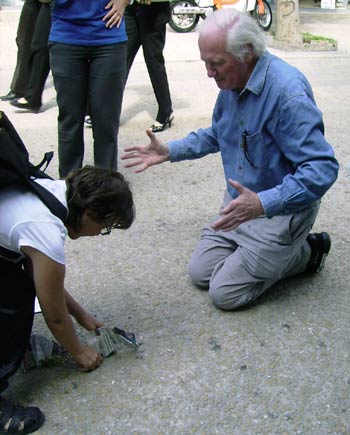
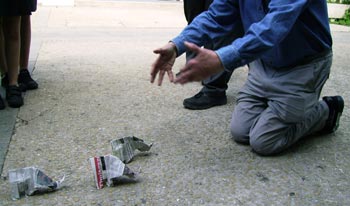
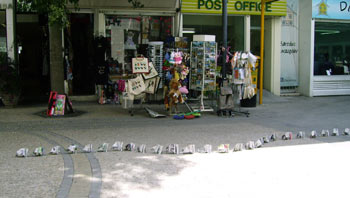
Two days earlier, on May 7th, I began laying out my herd of elephants about 500 metres south of the Lidhras / Ledra Street border crossing. It seemed appropriate because I'd arrived in Cyprus from the south. In consultation with a local Bahai, this seemed a good spot because I didn't want them to be too close to the border. I wanted the elephants to be in a relaxed area.
I made this earlier performance at the request of this man because he wanted to bring his high school students to encounter this, and so it had to be on a weekday. I decided to walk the elephants northward until I ran out.
Later, after the two days of repeated border 'crossing' performances, I realised that I encountered more Greek Cypriots than I had at the border. Here they were shop owners or shoppers.
Some were critical of the use of an elephant as a symbol for peace which was then an opportunity for a discussion on what symbols were suitable and why.
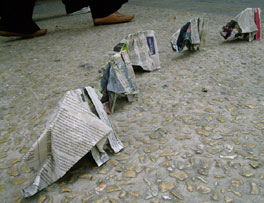
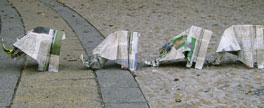
>> Click to view a high quality
(157 kb) version of this image
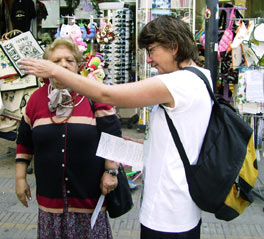
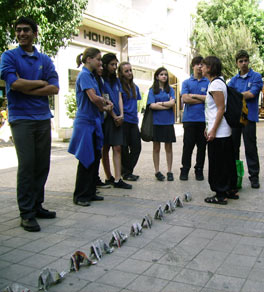
The teacher of the class wanted to know why the elephants were going in a straight line and I said it was "because it was easier to keep them under control".
He then sat down in front of the line which forced me to change direction.
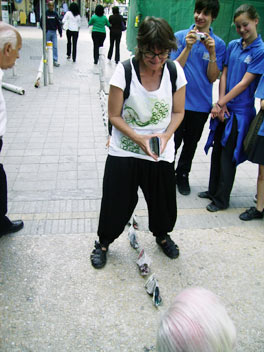
The t-shirt I was wearing was an artwork by British artist, Elaine Arkell, also part of the go-ganesha-go art project / festival. Her intention was for someone to wear the t-shirt during the festival and so I wore it as part of my uniform for the performances I made in Cyprus.
Her image is of elephants blowing out peace symbol bubbles.
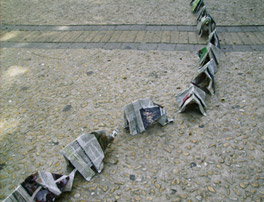
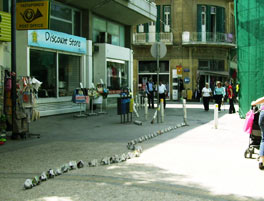
After about two hours I packed them up into a shopping bag and carried them across the border to the historic inn (the Büyük Han) on the north side of the checkpoint. I had been invited to visit and had permission from the artists who had studios there, to air the elephants.
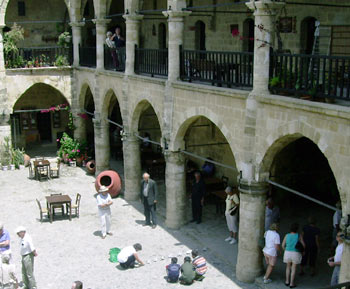
The origami elephants on 7 May, 2009
in the Ottoman built Büyük Han (The Great Inn).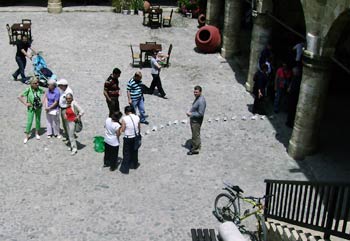
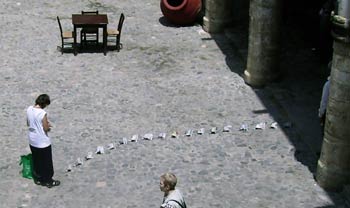
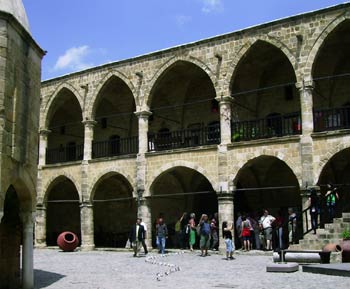
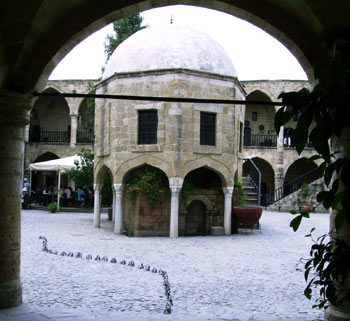
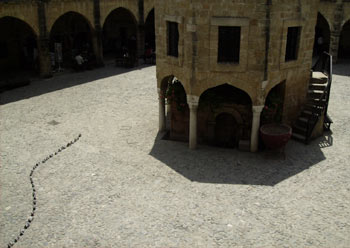
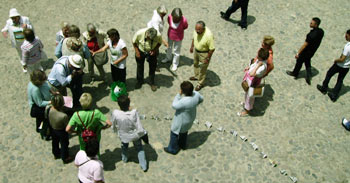
>> Click to view a higher quality (214 kb) version of this image
Here I mostly engaged in German with tourists.
Two English speaking Turkish tourists asked me what country
I was in which led to a discussion about their claim that this
was Turkey. I argued that tourists didn't have the right to act like
colonizers. Without these elephants we would never have
engaged.
When the occasion felt right, I engaged with the
'elephant in the room' but on the whole I steered any discussion
towards more lighthearted topics, such as the elephants being
tourists that do not leave any footprints.
The Büyük Han (1572) under renovation for a decade (1992-2002) and among wth earliest of the Ottoman public works is now a social meeting place and a tourist location. The lodging rooms on the two floors that surround a courtyard are in use by artisans and artists as studios or shops.
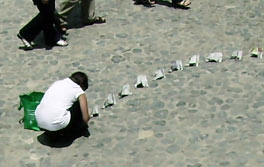
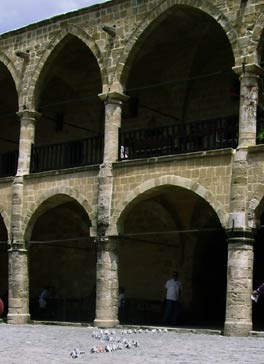
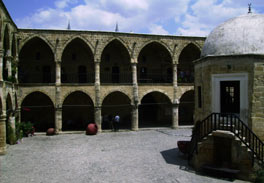
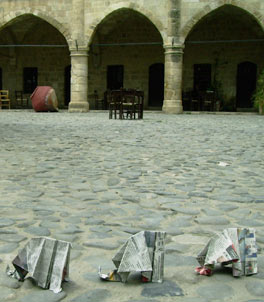
>> Click to view a highhigher quality
(107 kb) version of this image